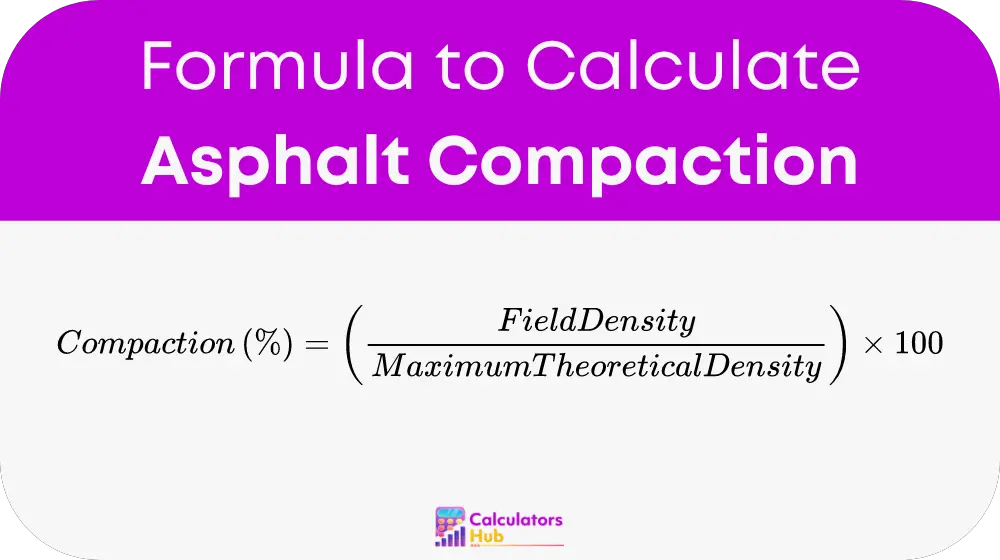The Asphalt Compaction Calculator helps construction teams determine the compaction percentage of the asphalt they are laying. This is critical in ensuring that the asphalt pavement will be durable enough to withstand traffic loads and environmental conditions. The calculator takes into account the density of the asphalt in the field and compares it to its maximum theoretical density as determined in laboratory conditions. This comparison provides the percentage of compaction achieved, informing teams whether the asphalt has been sufficiently compacted.
Formula of Asphalt Compaction Calculator
The formula used to calculate asphalt compaction is:

Where:
- Compaction (%) is the percentage of compaction achieve.
- Field Density is the density of the asphalt measure in the field, typically in pounds per cubic foot (pcf) or kilograms per cubic meter (kg/m³).
- Maximum Theoretical Density is the laboratory-measured density of the asphalt mixture, which serves as a benchmark for optimal compaction.
This formula is fundamental in achieving the correct compaction rate, which is key to the longevity and effectiveness of the pavement.
Table of General Terms
Here’s a quick reference table for terms related to asphalt compaction:
| Term | Definition | Common Values |
|---|---|---|
| Compaction (%) | The percentage of compaction achieved compared to the ideal | 90%, 95%, 100% |
| Field Density | Actual density of the asphalt measured on site | 140 pcf, 2,240 kg/m³ |
| Maximum Theoretical Density | The optimal density of the asphalt as determined in laboratory conditions | 145 pcf, 2,320 kg/m³ |
Example of Asphalt Compaction Calculator
Consider a scenario where the field density of the asphalt is measure at 140 pcf, and the maximum theoretical density is 145 pcf. Using the calculator, the compaction level would be:
Compaction = (140 / 145) × 100 = 96.55%
This example demonstrates that the asphalt compaction is approximately 96.55%, indicating a high level of compaction close to the optimal density.
Most Common FAQs
A1: Proper asphalt compaction ensures the pavement has sufficient density to withstand traffic and weather conditions, reducing maintenance costs and extending the lifespan of the road.
A2: Inadequate compaction can lead to pavement distresses such as rutting, cracking, and moisture damage, which compromise the structural integrity and safety of the road.
A3: Yes, the calculator is versatile and can be use for different types of asphalt mixtures. As long as the correct densities are input for both field and theoretical values.